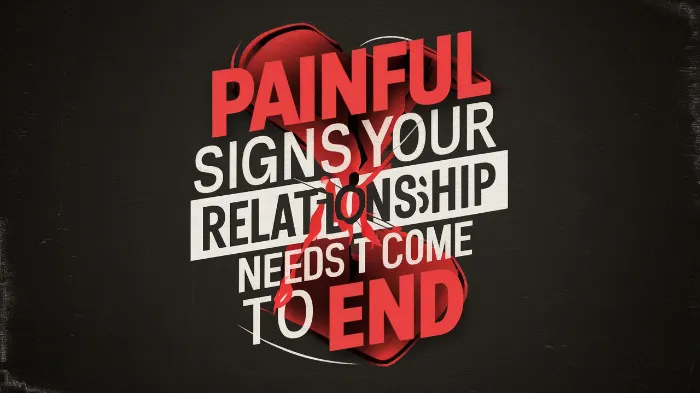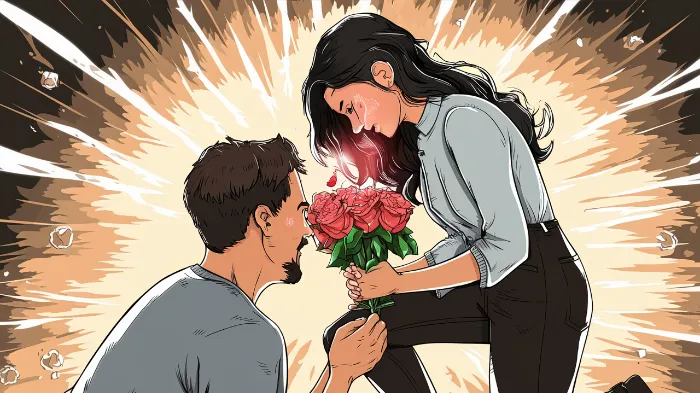
Are you feeling like something is off in your relationship, but you can't quite put your finger on it? Are you questioning whether your partnership is still worth fighting for? It might be time to face the hard truth: your relationship might be on its last legs. In this article, we'll explore 15 painful signs that your relationship needs to end. By understanding these red flags, you can start taking steps to prioritize your emotional well-being and make informed decisions about your future.
Do You Know?
Checklist of 15 Relationship Red Flags: Finding Peace
Use this checklist to reflect on the state of your partnership and identify any red flags that may indicate it's time to move on.
| Sign | Description |
|---|---|
| 1. Diverging Life Goals | Your visions for the future and core values have become fundamentally incompatible. |
| 2. Financial Incompatibility | You and your partner have vastly different financial priorities or habits. |
| 3. Misaligned Social Preferences | You feel a growing emotional disconnect, due to the opinion of people outside your relationship. |
| 4. Core Value Differences | Core value differences span religious and family values, career aspirations, and views on children and parenthood. |
| 5. Religious and Family Values | Religious and family values often serve as the cornerstone of an individual's moral and ethical compass. |
| 6. Varying Career Aspirations | Whether it's a matter of time investment, relocation, or financial objectives, differing career goals can create a gap that's difficult to bridge. |
| 7. Views on Children and Parenthood | It's crucial to have open and honest conversations about your values when it comes to children so that you and your partner are on the same page. |
| 8. Behavioral and Lifestyle Changes | As relationships mature, partners may experience shifts in behavior and lifestyle that can either strengthen their bond or signify a need for reevaluation. |
| 9. Growing Apart Over Time | The sensation of drifting apart from your partner can be a heart-wrenching indication that your relationship is faltering. |
| 10. Communication Breakdown | You and your partner struggle to express thoughts, feelings, and needs effectively. |
| 11. Trust and Commitment Issues | Infidelity or a persistent lack of trust has eroded the foundation of your relationship. |
| 12. Well-being and Relationship Satisfaction | When a partnership becomes a source of constant stress, negativity, or emotional turmoil, it can have a detrimental impact on your overall well-being and relationship satisfaction. |
| 13. Unhappiness and Lack of Support | This could manifest through a lack of emotional backing during challenging times or the absence of encouragement for personal aspirations. |
| 14. Emotional Neglect and Intimacy Decline | The decline of intimacy, both emotional and physical, often accompanies feelings of neglect. |
| 15. Disrespect for Personal Goals | Feeling belittled, criticized, or controlled regarding one's career aspirations can indicate an unhealthy dynamic in the relationship. |
1. Divergent Life Goals
Having shared goals and values is a cornerstone of a successful, long-lasting relationship. When partners share a similar vision for their future, it creates a strong foundation of understanding, compromise, and mutual support. However, if you and your significant other have fundamentally different visions and values, it can lead to a rift that may be impossible to bridge.
Ask yourself: Do you and your partner have compatible life goals? Do you share similar values when it comes to important matters like family, career, finances, or personal beliefs? If the answer is no, it might be time to reconsider your partnership.
2. Financial Incompatibility
An area of potential conflict is differing financial habits. A partnership where one individual is cautious and frugal, while the other is more liberal with their spending, can lead to ongoing disputes and resentment. Financial incompatibility ranks high as a contributing factor to relationship strain, as it touches upon security, lifestyle choices, and future planning. The stress of financial conflict is a substantial reason why couples may decide to end their relationships.
3. Misaligned Social Preferences
Social preferences can be a significant source of relationship incompatibility.
Imagine this scenario: One partner thrives in large group settings, constantly seeking new social connections and experiences, while the other prefers intimate gatherings or solitude, finding comfort in quieter moments. This mismatch in social needs can strain a relationship, as both parties may feel their preferences are not respected or understood.
The recognition of these incompatibilities is important for individuals seeking to build or maintain healthy, fulfilling relationships. While some differences can be navigated and negotiated, others may be insurmountable, necessitating a difficult but necessary decision to end the relationship.
4. Core Value Differences
In a relationship, partners often encounter the rugged crossroads of core value differences. These fundamental beliefs and aspirations can become the fulcrum on which the balance of a partnership teeters. When values clash, the harmony of a relationship is tested, and it is here that couples must earnestly evaluate their compatibility. Core value differences span religious and family values, career aspirations, and views on children and parenthood.
5. Religious and Family Values
Religious and family values often serve as the cornerstone of an individual's moral and ethical compass. When two people enter a relationship with divergent religious beliefs or differing perspectives on family dynamics, it can lead to significant friction. For some, these aspects are non-negotiable, deeply ingrained from upbringing, and are pivotal in shaping life decisions. As Bustle suggests, such incompatibilities are substantial factors that may prompt couples to reassess their future together. If partners find an impasse in reconciling these values, it may be one of the 15 painful reasons to break up with your partner.
6. Varying Career Aspirations
The trajectory of one's career often requires dedication and sacrifice, and when two partners have varying career aspirations, it can lead to a discordant relationship. Whether it's a matter of time investment, relocation, or financial objectives, differing career goals can create a gap that's difficult to bridge. Support for one another's career paths is a hallmark of a thriving relationship, but a lack of respect or understanding for a partner's professional ambitions, as noted by Elite Daily, may signal a need for change.
7. Views on Children and Parenthood
A mismatch in desires regarding children can be a major stumbling block in a relationship. It's not an easily resolved issue and often represents a fundamental incompatibility. When one partner envisions a future filled with the joys and challenges of parenthood, but the other does not share this vision, it may be time to confront the painful truth of your divergent paths.
It's crucial to have open and honest conversations about your desires, values, and expectations when it comes to children. By doing so, you can ensure that you and your partner are on the same page and build a strong foundation for a successful, long-term relationship.
8. Behavioral and Lifestyle Changes

As relationships mature, partners may experience shifts in behavior and lifestyle that can either strengthen their bond or signify a need for reevaluation. It's crucial to recognize when these changes are signposts for deeper issues that cannot be reconciled, potentially leading to the painful conclusion that ending the relationship is the healthiest choice.
9. Growing Apart Over Time
The sensation of drifting apart from your partner can be a heart-wrenching indication that your relationship is faltering. As experts at LinkedIn note, the emotional and psychological strain of feeling a growing gap where there was once closeness and intimacy can be overwhelming. This emotional distance may stem from evolving interests, values, or life goals that no longer align, making it increasingly difficult for partners to find common ground and maintain a deep connection. Perhaps you've noticed a lack of shared interests, diminished physical intimacy, or a general feeling of disconnection from your significant other.
10. Communication Breakdown
Effective communication is the cornerstone of any healthy relationship. A breakdown in this area can manifest as frequent misunderstandings, arguments, or an overall lack of dialogue. When partners no longer feel heard or understood, it can lead to a buildup of resentment and emotional disconnect.
Changes in communication patterns can be subtle, but they often reflect deeper issues that need to be addressed. If efforts to improve communication fail, it may be a sign that the relationship has reached an impasse where both individuals are better off going their separate ways.
11. Trust and Commitment Issues

Trust and commitment are foundational elements of a healthy relationship. When these core principles are compromised, it can lead to a painful realization that the relationship may need to end. Here we will discuss two major red flags: infidelity and abuse, both of which can be detrimental to the well-being of the individuals involved.
Infidelity and Broken Trust
Infidelity is a breach of trust that can cause immense pain and erode the foundation of security between partners. The act of being unfaithful goes beyond physical betrayal; it shatters the emotional and psychological bond that is essential for a relationship to thrive. According to the Williamsburg Therapy Group, infidelity is a significant reason for relationship breakdown.
Trust is not easily rebuilt once it has been broken, and for many, this breach is one of the 15 painful reasons to break up with your partner. A lack of trust in a relationship, whether due to past betrayals or ongoing suspicions, can create an environment of tension and insecurity, potentially leading to its end .
Emotional and Physical Abuse
Emotional and physical abuse are severe issues that warrant the immediate consideration of ending a relationship. No individual should endure the pain of being belittled, criticized, controlled, or physically harmed. Emotional abuse can be just as damaging as physical violence, leading to long-term psychological trauma and a diminished sense of self-worth.
The impact of abuse can diminish a person's quality of life over time, influenced by factors such as stress, work demands, or unresolved conflicts, all of which can lead to feelings of disconnection and dissatisfaction. It is essential to remember that trust and commitment are not just components of a relationship; they are the very essence that holds it together. When these are compromised beyond repair, it may be time to let go and move forward towards a healthier future.
12. Well-being and Relationship Satisfaction: A Delicate Balance
A healthy, fulfilling relationship is one that nurtures the well-being and personal growth of both partners. When a partnership becomes a source of constant stress, negativity, or emotional turmoil, it can have a detrimental impact on your overall well-being and relationship satisfaction. Signs like emotional distance, lack of trust, and unresolved conflicts can create an environment that is toxic for your mental, emotional, and even physical health. It's crucial to recognize when a relationship is no longer contributing positively to your life and has instead become a hindrance to your happiness and personal growth.
13. Unhappiness and Lack of Support
Unhappiness in a relationship often stems from feeling unsupported by one's partner. This could manifest through a lack of emotional backing during challenging times or the absence of encouragement for personal aspirations. Continuously feeling unhappy, unsupported, or unfulfilled can be a glaring sign that it may be time to reassess the partnership's viability .
Experiencing prolonged periods of discontent can lead to a detrimental impact on one's mental and emotional health. It's essential for individuals to feel valued and understood by their partners, and when this need isn't met, it might suggest the relationship is unable to provide a crucial element for personal well-being.
14. Emotional Neglect and Intimacy Decline
Emotional neglect is another significant factor that can erode the foundations of a relationship. When one partner consistently feels disregarded or their need for emotional connection goes unmet, it may be a painful catalyst for ending the relationship. Emotional support and connection are essential components of a fulfilling partnership.
The decline of intimacy, both emotional and physical, often accompanies feelings of neglect. Various factors, including stress, work demands, or unresolved conflicts, can lead to this decline, resulting in disconnection and dissatisfaction. Intimacy is a barometer for relationship health, and when it diminishes, it's an indicator that the relationship is struggling .
15. Disrespect for Personal Goals
Mutual respect is a cornerstone of any relationship. When a partner does not respect or support the other's personal goals and aspirations, it can erode the relationship's foundation. For instance, feeling belittled, criticized, or controlled regarding one's career aspirations can indicate an unhealthy dynamic in the relationship, potentially leading to its dissolution .
Indicators of disrespect for personal goals include:
- Lack of interest in a partner's professional life or hobbies
- Dismissive attitude towards a partner's achievements or ambitions
- Preventing a partner from pursuing opportunities for growth
The AI Companion for Heartbreak
When a relationship ends, the emotional pain can be excruciating. Candy AI offers a unique solution – an AI girlfriend to provide companionship during this difficult transition. This advanced AI virtual assistant uses natural language processing to have intelligent, empathetic conversations tailored to each user's needs.
Candy's AI girlfriend offers a caring, non-judgmental ear to listen without bias. She can discuss the breakup, provide coping strategies, and even virtual hugs when sadness strikes. With 24/7 availability, she's always there as a supportive friend. The AI adapts to each person's preferences for the ideal post-breakup companion.

For those struggling after a split, Candy AI's artificial intelligence girlfriend allows processing emotions in a healthy way. Her conversational abilities create a sense of connection, facilitating the healing process. Emerge from heartbreak with this innovative AI by your side.
FAQs Related to Relationship Red Flags
1. How do I know if it's time to end my relationship?
If you've noticed multiple signs from this article, such as a lack of communication, emotional distance, or a breakdown of trust, it may be time to reevaluate your relationship's viability. However, it's important to have open and honest conversations with your partner before making a final decision.
2. Is it possible to save a relationship after recognizing these signs?
In some cases, with commitment from both partners and professional help (such as couples counseling), it may be possible to address and overcome these issues. However, if efforts to reconcile have been unsuccessful, it may be healthier to part ways.
3. How can I cope with the pain of a breakup?
Healing after a breakup takes time and self-care. Surround yourself with a supportive network, engage in activities that bring you joy, and be patient with yourself. Consider seeking professional help from a therapist if you're struggling to cope.
4. How do I know if I'm making the right decision?
Trust your instincts and be honest with yourself about the state of your relationship. If you've made genuine efforts to address the issues without success, ending the relationship may be the healthiest choice for your well-being.
5. How can I move on and start anew after a breakup?
Embrace this as an opportunity for personal growth and self-discovery. Rediscover your passions, set new goals, and be open to new experiences and relationships when the time is right. Remember, brighter days lie ahead.
6. Is it normal to have doubts or second thoughts after a breakup?
Absolutely. Doubts and second thoughts are common after ending a significant relationship. However, if you've made your decision based on careful consideration and a genuine desire for personal well-being, trust in your choice and focus on the future.
More from AdultBooklet

Conclusion: Making the Right Decision for Your Well-Being
Recognizing the painful signs that your relationship needs to end is a courageous first step toward prioritizing your emotional well-being. While the decision to part ways is never easy, it's important to remember that your happiness and personal growth should be the top priorities.
As you reflect on the signs discussed in this article, be honest with yourself about the state of your partnership. Have you and your partner made genuine efforts to address the issues, or have they become insurmountable obstacles? If the latter is true, it may be time to embrace the difficult but necessary choice of ending the relationship.
Remember, this decision is not a failure, but rather a brave act of self-love and a commitment to creating a life that aligns with your values and aspirations. Trust your instincts, seek support from loved ones, and have faith that better days lie ahead.







